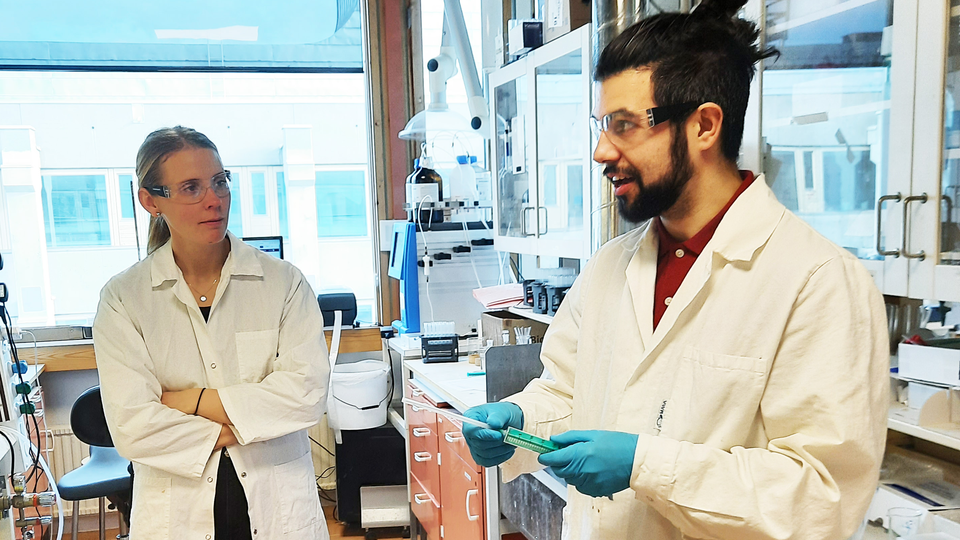
Pedro Tortajada Palmero, Stockholm University, introducing a new chemical reaction to Therese Kärnman, IVL Swedish Environmental Research Institute.
Interaction is the best way forward
In Mistra SafeChem case studies have emerged as a most efficient way forward to ensure interactions within the complex programme. In case studies transdisciplinary research is created which is needed to reach the programme vision to enable and promote the expansion of a safe, sustainable and green chemical industry in Sweden. Several new case studies have started in 2021.
In the case studies, the toolbox of new methods for hazard screening, risk quantification, life cycle assessments and materials management is applied to test and evaluate specific processes' adherence to the green chemistry principles and sustainability. Methods for analytical screening of chemicals of emerging concern are being refined and applied for different materials and media.
As of 2021 a wide variety of case studies are executed. The two initially planned cover chemical substitution in materials in consumer use. During the year studies were added focusing on development in catalysis, recycling and re-sourcing to biobased materials.
Here we look into two of the new case studies in detail: The sustainability assessment of a novel hydrogenation reaction process and Biocatalytic routes to amides for safer and more sustainable by design in discovery chemistry.
A new hydrogenation reaction process
The sustainability assessment of a novel hydrogenation reaction process has its focus on electrochemical proton reduction over nickel foam as an alternative to the use of noble metals, i.e. palladium, for the hydrogenation reaction. The use of earth-abundant metals hold promise with regards to issues with resource scarcity, but the novel reaction has the potential to also reduce the need for fossil-based hydrogen production and transportation due to in situ hydrogen generation.
In this case study, the Mistra SafeChem toolbox is applied to explore if a nickel foam catalysed hydrogenation of alkenes to alkanes has an improved environmental and human health performance compared to a scenario where the conventional technique is applied. The toolbox is applied in an iterative process starting from hazard and exposure assessment for the chemicals in the reaction process, a screening life cycle assessment (LCA) with a broad scope in impact categories and a global material flow analysis (MFA) for nickel and palladium. The LCA is currently being extended with additional focus on chemical footprint and upscaling of the process.
Biocatalytic routes
The formation of amide bonds is an important transformation in the production of organic molecules. Amides are used in a wide range of fields, and as a synthetic intermediate product. The classical synthetic method to produce amides using harsh chemical routes has many drawbacks, one is the generation of large quantities of waste. Also, some of the activating agents are not environmentally friendly.
One alternative route to acquire the amide functionality would be to use biocatalysts, enzymes. Research has reported that biocatalytic reactions using engineered enzymes would be highly competitive for large scale production of pharmaceuticals in terms of efficiency and sustainability. To assess if these benefits exist also for amide bond synthesis a case study is conducted.
The Mistra SafeChem toolbox is applied to explore if products are safe and more sustainable. Extensive amounts of amide containing molecules, important for the pharmaceutical industry, have been identified and the molecules are assessed using the in silico model for hazard prediction, developed within the programme, to identify safe building blocks. Life cycle thinking is applied to avoid potential burden shifting from one impact to another and an LCA is planned for an upscaled process for biocatalyst production.
This text is from Mistra SafeChem's annual report for 2021. Read the full annual report here. Pdf, 8.9 MB.
Pdf, 8.9 MB.
-
2024-06-28 | newsImpressive achievements of Mistra SafeChem in phase 1
-
2024-06-19 | newsNew report: Crystal Engineering for Water Treatment
-
2024-05-17 | newsSee the full agenda for our final webinar
-
2024-05-15 | newsThe Mistra SafeChem in silico toolbox presented at the SETAC conference
-
2024-04-03 | newsFour more years – Mistra SafeChem gets go-ahead for second phase

